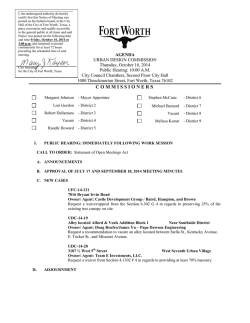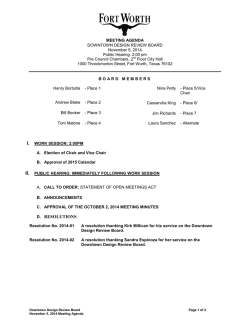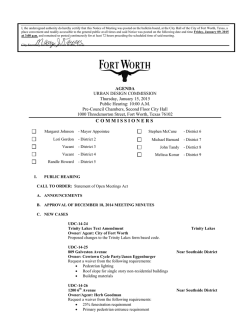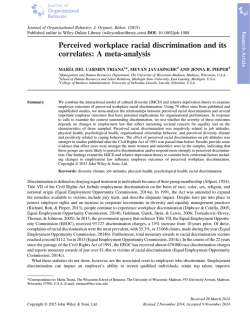
Testimony of Jennifer Mathis Director of Programs Bazelon Center
Testimony of Jennifer Mathis Director of Programs Bazelon Center for Mental Health Law On behalf of the Consortium for Citizens with Disabilities (CCD) Before Senate Committee on Health, Education, Labor and Pensions EMPLOYER WELLNESS PROGRAMS: BETTER HEALTH OUTCOMES AND LOWER COSTS Jan. 29, 2015 Chairman Alexander, Ranking Member Murray, and Members of the Committee: Thank you for inviting me to testify concerning this important issue. My name is Jennifer Mathis. I serve as Director of Programs at the Bazelon Center for Mental Health Law, a national non-profit organization that works to promote equal opportunities for individuals with mental disabilities in all aspects of life through litigation, policy advocacy and training. I am here also on behalf of the Consortium for Citizens with Disabilities, a coalition of national disability organizations working for national public policy that ensures the self-determination, independence, empowerment, integration and inclusion of children and adults with disabilities in all aspects of society. While CCD believes that wellness programs can be useful tools to promote health and well-being, we have significant concerns about their potential to discriminate against individuals with disabilities if applicable laws such as the Americans with Disabilities Act (ADA) are not followed. As you know, the employment rate of people with disabilities is far lower than that of any other group tracked by the Bureau of Labor Statistics, and people with disabilities have been disproportionately impacted by the economic downturn. Against this backdrop, we think it is important to ensure that employer-based wellness programs are implemented to promote healthy behaviors without eroding longstanding and critical workplace protections for people with disabilities. In light of the different understandings about the ADA’s interaction with the Affordable Care Act in this area, we hope that the Equal Employment Opportunity Commission (EEOC) will soon issue guidance or regulations to clarify the ADA’s application to wellness programs. Such clarification would benefit both employers and employees, and afford stakeholders an opportunity to offer input about how the requirements of the ACA and the ADA should interact in the area of wellness. Moreover, the Departments of Labor, Health and Human Services, and Treasury have left this door open, making clear in their final regulations implementing the ACA’s wellness provisions that other laws such as the ADA may also apply and impose additional requirements. Employers and employees alike are eager for clarification. CCD believes that the ADA and the ACA co-exist easily in their application to wellness programs, and that the requirements of both laws can be followed at the same time. We look forward to a regulatory process that will allow the EEOC to clarify how these laws intersect. Absent EEOC action through policymaking or litigation, we are concerned that many employees with disabilities will continue to be faced with this predicament: due to the threat of losing thousands of dollars for refusing to respond to intrusive wellness program medical inquiries, many employees with disabilities are left with little choice but to disclose highly sensitive information about their disabilities—information that the ADA intended to protect from disclosure, as it has nothing to do with these employees’ ability to do their jobs. In some cases, the information solicited is not even connected to wellness services actually offered. The ADA’s 2 confidentiality protections are among its most important; Congress put these protections in place in the ADA based on consideration of an extensive record and a long history of intractable discrimination against people with disabilities in the workplace. It is critical for people with disabilities to maintain the privacy rights afforded to them under the ADA as they participate in wellness programs. The ADA prohibits employers from penalizing employees for failing to answer non-job related medical inquiries as part of a wellness program.1 The ADA prohibits discrimination on the basis of disability with regard to the “terms, conditions, and privileges of employment,” 42 U.S.C. § 12112(a), including in contractual relationships with fringe benefits providers that have the effect of discriminating against employees with disabilities, id. at § 12112(b)(2). “Discrimination” under the ADA is defined as, inter alia, conducting medical examinations or inquiries of employees that are not job-related and consistent with business necessity. 42 U.S.C. § 12112(d)(4)(A).2 There is an exception permitting “voluntary medical examinations, including voluntary medical histories, which are part of an employee health program available to employees at that work site.” Id. at § 12112(d)(4)(B) (emphasis added); see also EEOC Enforcement Guidance on Disability-Related Inquiries and Medical Examinations of Employees Under the Americans with Disabilities Act (July 27, 2000) at Question 22, http://www.eeoc.gov/policy/docs/guidance-inquiries.html (“EEOC Guidance”). The purpose of the ADA’s bar on medical inquiries that are not job-related and consistent with business necessity is to guard against discrimination and ensure that disability-related inquiries are limited to those necessary to determine whether an individual can do the job. See S. Rep. 101-116, at 39-40 (1989) (“As was abundantly clear before the Committee, being identified as disabled often carries both blatant and subtle stigma. An employer’s legitimate needs will be met by allowing the medical inquiries and examinations which are job-related.”). As the EEOC noted in its guidance concerning disability-related inquiries of employees: Historically, many employers asked applicants and employees to provide information concerning their physical and/or mental condition. This information often was used to exclude and otherwise discriminate against individuals with disabilities -- particularly nonvisible disabilities, such as diabetes, epilepsy, heart disease, cancer, and mental illness -- despite their ability to perform the job. The ADA’s provisions concerning disability-related inquiries and medical examinations reflect Congress's intent to protect the rights of applicants and employees to be assessed on merit alone, while protecting 1 The ADA also has other applications to wellness programs, including requiring reasonable modifications to requirements that individuals meet certain health targets where such requirements would deny equal opportunity based on disability. I focus, however, on penalties for failure to respond to wellness program medical inquiries since that issue has been the primary focus of attention in recent discussions. 2 There is little dispute that the medical inquiries asked as part of wellness programs typically relate to an employee’s health and not to the ability to perform job duties. 3 the rights of employers to ensure that individuals in the workplace can efficiently perform the essential functions of their jobs.3 In the absence of a statutory definition of voluntary, “we construe a statutory term in accordance with its ordinary or natural meaning.” FDIC v. Meyer, 510 U.S. 471, 476 (1994) The ordinary meaning of “voluntary” is “not impelled by outside influence” and “[w]ithout valuable consideration.” Black’s Law Dictionary (9th ed. 2009). See also Merriam Webster Dictionary (“unconstrained by interference” and “without valuable consideration”). Since 2000, the EEOC, charged with enforcing and interpreting Title I of the ADA, has defined “voluntary” for purposes of this provision consistently with this common-sense definition. According to the agency, “voluntary” means that an employer may neither require participation nor penalize employees who do not participate.4 Thus, medical questions that an employee is penalized for not answering are not voluntary.5 Indeed, the EEOC similarly interpreted a parallel provision in the Genetic Information Non-Discrimination Act (GINA). The Act prohibits covered employers from requesting, requiring or purchasing genetic information from employees, except in limited circumstances including when the employee voluntarily discloses the information as part of a wellness program.6 In its implementing regulations, the EEOC states that the “wellness program” 3 EEOC Guidance, General Principles. 4 EEOC Guidance, Question 22. 5 As recognized by the Department of Health and Human Services, Department of the Treasury, and Internal Revenue Service, a penalty for failure to participate in a wellness program should be treated the same as an inducement to participate. See, e.g., Final Rule, Incentives for Nondiscriminatory Wellness Programs in Group Health Plans, 78 Fed. Reg. 33158, 33160 (June 3, 2013) (“References in the final regulations to a plan providing a reward include both providing a reward (such as a discount or rebate of a premium or contribution, a waiver of all or part of a cost-sharing mechanism, an additional benefit, or any financial or other incentive) and imposing a penalty (such as a surcharge or other financial or nonfinancial disincentive).”). Thus employees who choose to forego a financial inducement to participate are effectively penalized financially for not participating. 42 U.S.C. § 2000ff-1(b)(2). The statute allows employers to acquire genetic information “where--(A) health or genetic services are offered by the employer, including such services offered as part of a wellness program; (B) the employee provides prior, knowing, voluntary, and written authorization; (C) only the employee (or family member if the family member is receiving genetic services) and the licensed health care professional or board certified genetic counselor involved in providing such services receive individually identifiable information concerning the results of such services; and (D) any individually identifiable genetic information provided under subparagraph (C) in connection with the services provided under subparagraph (A) is only available for purposes of such services and shall not be disclosed to the employer except in aggregate terms that do not disclose the identity of specific employees.” Id. 6 4 exception applies only where “the provision of genetic information is voluntary, meaning the covered entity neither requires the individual to provide genetic information nor penalizes those who choose not to provide it.” 29 C.F.R. § 1635.8(b)(2)(i)(A). Accordingly, an employer “may not offer a financial inducement for individuals to provide genetic information.” Id. § 1638.5(b)(2)(ii). While an employer may offer financial inducements for completion of health risk assessments that include questions about family medical history or other genetic information, the employer must make clear, in language reasonably likely to be understood by those completing the health risk assessment, that the inducement will be made available whether or not the participant answers questions regarding genetic information. Id. The ACA did not silently repeal the ADA’s provisions concerning medical inquiries in wellness programs. First, it is important to note that the ACA did not supersede the ADA’s requirement that non-job related medical inquiries in wellness programs be voluntary and failure to answer not be penalized. It is well-established law that courts presume that Congress did not repeal prior laws without saying so. See Morton v. Mancari, 417 U.S. 535, 550-51 (1974) (“cardinal rule” of statutory construction that “repeals by implication are not favored”). It would be remarkable if Congress jettisoned the ADA’s detailed requirements concerning medical inquiries—a cornerstone of the ADA’s protections—without saying a word about this repeal in either the statute or in the legislative history. The ADA’s separate application to wellness programs was also recognized by the Departments of Labor, Health and Human Services, and Treasury in their final wellness regulations: As noted in section II.H later in this preamble, these final regulations are implementing only the provisions regarding wellness programs in the Affordable Care Act. Other State and Federal laws may apply with respect to the privacy, disclosure, and confidentiality of information provided to these programs. For example . . . employers subject to the Americans with Disabilities Act of 1990 (ADA) must comply with any applicable ADA requirements for disclosure and confidentiality of medical information and non-discrimination on the basis of disability.7 (emphasis added) *** Compliance with the HIPAA nondiscrimination rules (which were later amended by the Affordable Care Act), including the wellness program requirements in paragraph (f), is not determinative of compliance with any other provision of ERISA, or any other State or Federal law, including the ADA. This paragraph is unchanged by these final 7 78 Fed. Reg. 33158, 33165. 5 regulations and remains in effect. As stated in the preamble to the 2006 regulations, the Departments recognize that many other laws may regulate plans and issuers in their provision of benefits to participants and beneficiaries. These laws include, but are not limited to, the ADA, Title VII of the Civil Rights Act of 1964, Code section 105(h) and PHS Act section 2716 (prohibiting discrimination in favor of highly compensated individuals), the Genetic Information Nondiscrimination Act of 2008, the Family and Medical Leave Act, ERISA’s fiduciary provisions, and State law.8 (emphasis added) The ACA does not address whether penalties may be imposed for failure to answer wellness program medical inquiries, and to the extent that the ACA addresses penalties generally, it speaks to whether such penalties constitute insurance discrimination, not workplace discrimination. The ACA is not an employment discrimination statute. It does not purport to address whether wellness program penalties or other aspects of wellness programs constitute disabilitybased employment discrimination. Instead, the ACA prohibits disability-based discrimination in insurance coverage, providing that “[a] group health plan and a health insurance issuer offering group or individual health insurance coverage may not establish rules for eligibility (including continued eligibility) of any individual to enroll under the terms of the plan or coverage based on” one of eight “health status-related factors,” including “health status” and “disability.” Public Law 111-148 (Mar. 23, 2010), § 2705(a). To comply with this non-discrimination provision, wellness programs that offer rewards for satisfying a standard based on a health status factor must meet certain conditions, including a limit on such rewards to no more than 30 percent of the cost of employee-only coverage. Id. §§ 2705(j)(1)(C), (j)(3).9 Wellness programs offering rewards that are not based on satisfying a standard related to a health status factor—which presumably would include rewards for answering medical inquiries—comply with the nondiscrimination requirement as long as participation in the program is made available to all similarly situated individuals. Id. §§ 2705(j)(1)(B), (j)(2). The ACA does not conflict with the ADA’s requirements concerning medical inquiries in wellness programs and both laws should be given effect. “[W]hen two statutes are capable of co-existence, it is the duty of the courts, absent a clearly expressed congressional intention to the contrary, to regard each as effective.” Morton v. Mancari, 417 U.S. 535, 551 (1974). The ADA’s provisions concerning medical inquiries and the ACA’s provisions concerning wellness program penalties are clearly capable of coexistence 8 Id. at 33168. 9 Among other things, such programs must not be a subterfuge for discriminating based on a health status factor, and must allow reasonable alternative standards for an individual to receive the reward when a medical condition makes it unreasonably difficult or medically inadvisable for him or her to meet the standard. Id. § 2705(j)(3)(B), (D). 6 and both must be given effect. If the ACA required penalties or rewards that were prohibited by the ADA, the two statutes would conflict. But the mere fact that the ACA provides that certain penalties do not violate its requirement concerning non-discrimination in insurance coverage does not mean that such penalties comply with the ADA or other laws. Indeed, it is routine for two statutes that apply to the same conduct to impose independent obligations. See, e.g., K.M. v. Tustin Unified School Dist., 725 F.3d 1088 (9th Cir. 2013) (Individuals with Disabilities Education Act (IDEA) coexists with ADA and public schools must comply with both; while public school’s failure to provide word-for-word transcription service to deaf student did not violate IDEA’s requirement to provide a free and appropriate public education, that did not foreclose claim that this failure violated ADA’s requirement to provide student with equally effective communication). See also Statement of Interest of the United States of America in S.S. v. Springfield Public Schools, Civ. Action No. 3:14-cv-30116, at 2, http://www.ada.gov/briefs/springfield_ma_soi.pdf (“. . . while the ADA and IDEA provide complementary protections for many students with disabilities, they are not identical in purpose or scope and impose distinct obligations on school districts in furtherance of their respective statutory mandates. . . . [the ADA] may require different or additional measures to avoid discrimination against children with disabilities than the measures that are required to comply with IDEA.”). Where, as here, the two statutes do not even address the same issue—the ACA addresses what constitutes insurance discrimination and the ADA addresses what constitutes employment discrimination—it would be particularly inappropriate to look to the terms of the ACA to determine what constitutes a violation of the ADA. Both statutes apply to wellness programs and both impose independent obligations that do not conflict. Thank you for the opportunity to provide testimony on this important issue. The Consortium of Citizens with Disabilities appreciates the Committee’s interest in this issue and stands ready to assist in any effort to secure further clarification concerning the ADA’s application to wellness programs. 7
© Copyright 2026






